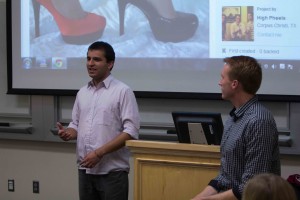The increase of crowdfunding projects in BYU’s own backyard is raising questions regarding the validity of these projects and their impact.
Crowdfunding has been employed as a method to raise funds to start a business, pay for band camp and raise money to produce an album.
“There are three types of crowdfunding,” said Daniel Falabella whose BYU crowdfunding class, BUS M 496R, raised more than $144,000 in 2013.

“The first is to make a dream or cause a reality, like the tamale lady,” Falabella said of the Utah valley GoFundMe campaign to help an elderly woman selling tamales to cover her husband’s medical bills. “The second is equity funding, which is not approved by the SEC but is approved by some countries. The third are pre-orders to create a product and take it to the next level.”
With more than $965 million pledged for “everything from films, games, and music to art, design, and technology,” Kickstarter is one of many crowdfunding sites where entrepreneurs, artist and other “movers and shakers” can see their dreams come to fruition.
Investors can contribute any amount of money toward a project but are refunded if the project does not reach 100 percent of its goal.
“Crowdfunding is the next evolution in entrepreneurship,” said Paul Wilson, who teaches a course on crowdfunding at BYU-Hawaii.
Jordan Monroe, a business management major, and his team did not have to pay for anything out of their own pocket to fund their first production run thanks to a successful Kickstarter campaign, which raised $18,000. Their creation, PhoneSoap, which charges and cleans cell phones, became a reality.
Monroe also helped run a crowdfunding campaign for Owlet, a smart baby monitor, winning second place at TechCrunch’s hardware competition.
“I love supporting entrepreneurship, new products. It breathes me,” Monroe said.
To donate or not to donate
Entrepreneurial crowdfunding experts like Wilson and Falabella tend to move away from crowdfunding projects with a charitable nature in favor of business ventures that are generally more trustworthy.
Monroe, of Burley, Idaho, said he’s skeptical of charity projects.
“It’s a lot easier to get scammed, but there is still legal recourse,” Wilson, said of security steps sites such as Kickstarter and indiegogo.com take to protect project contributors.
Wilson is particular about which projects he is involved with.
“The fundraising ones, I don’t participate,” Wilson said of projects seeking to pay for band camp or study abroad trips to Europe. “They’re very hard to verify.”
Deciding whether or not to contribute to a charity project versus a business venture comes down to personal expectations, according to Jeff Schwarting, whose team teaches crowdfunding with Falabella at BYU.
“Your $10 is gone when you donate to a charity. It’s altruistic,” Schwarting said.
Changing the business model
When BYU students Dan Shirley, Greg Christopher and Aaron Puglisi started soft goods design company Tessel, they didn’t have any actual products for interested customers. In fact, it’s been some time since they initially raised $56,000 in June 2013.
“We just had our highest month of sales,” said Christopher, of Reno, Nev., despite not having delivered products to customers who have already placed orders.
Like Wilson, Falabella has recognized the impact of crowdfunding on the traditional business model.
“Before, to start a business, you have to set up everything from branding to supply chain,” Falabella said. “Only the big guys could start up. The little guys would never have a chance to make a splash. It levels the playing field.”
Schwarting said that crowdfunding is a distribution channel that doesn’t require products. He said that crowdfunding allows one to sell first, then produce, rather than to produce then sell.
Preparing for Success
“The number one mistake people make when crowdfunding is losing money,” Schwarting said. “People don’t figure out costs. It’s poor planning on the financial end.”
If they had a chance to do everything again, Christopher and Puglisi, an industrial design major from Kansas City, Mo., would have laid out a solid plan to prepare for the worst.
“I would ask, ‘What are the potential obstacles ahead?’ and, ‘What are the walls?'” Christopher said to students who are interested in launching a business via crowdfunding.
With the gaining capital needed to fund production, the actual production of promised goods will often be late since inexperienced entrepreneurs don’t plan extra time for product fulfillment.
In the end, it is ultimately up to the individual or group to make dreams and goals a reality.
“You just have to do it. This is not rocket science,” Falabella said. “You can talk theory all you want, but you just have to do it.”




